FHB Interview with EDUARDO BARRACHINA, Trustee of the Fundación Hispano Británica
Eduardo Barrachina is President of the Spanish Chamber of Commerce in the United Kingdom, as well as senior associate and solicitor at White & Case LLP.
A first experience as an Erasmus exchange student at the University of Sheffield’s Faculty of Law, followed by a Master’s in International Financial Law at King’s College London ultimately lead Eduardo Barrachina to forge a life-long bond with both the United Kingdom and the wider Spanish expat community. As president of the Spanish Chamber of Commerce in London, he has been at the centre of efforts to strengthen communication and reinforce ties between Spanish businesses and the UK government. After more than thirteen years as a lawyer for White & Case, he has also overseen many complex international operations amongst some of the largest financial and corporate firms in the City.
Barrachina is a common fixture in the Spanish media and has also recently been on the panel of numerous fora on Brexit, including the Spanish Mixed Parliamentary Commission in 2017.
EUGENIA GUTIÉRREZ
Madrid, February 2021
After many months of negotiations, the United Kingdom and the European Union finally signed the long-awaited Withdrawal Agreement, marking the end of the Brexit transition and laying down the foundations for a free-trade agreement. What are the key points and which are – in your opinion – the main takeaways?
The final agreement offers few surprises given that minimal regulation for services and a zero-tariff regime for goods meeting rules of origin requirements were both foreseeable. The agreement is actually much wider than it seems and covers the exchange of goods, digital commerce, public procurement, fisheries, energy, intellectual property, climate change, transport and cooperation with regards to visas, social security and criminal justice.
Paradoxically, no free trade agreement will be able to match the advantages of neither the Single Market nor the Customs Union and will therefore inevitably create new barriers to trade.
The agreement should not be interpreted as the finishing line but rather as a starting point and is flexible enough to allow many sectors to benefit.
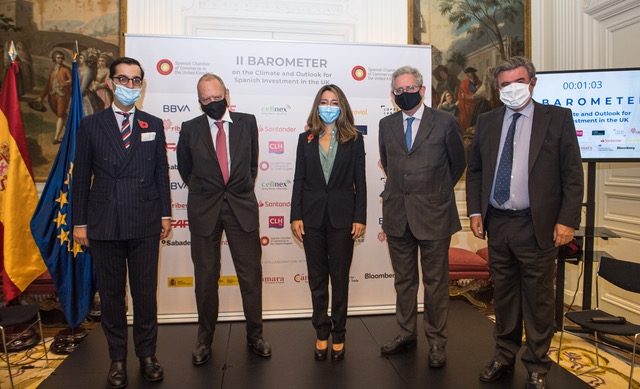
Lord Kinnoull, President of the House of Lords’ Commission for EU Affairs and Ambassador Carlos Bastarreche – October 2020.
You have previously stated that January 1st 2021 will be the beginning of negotiations rather than the end. What exactly do you mean?
The agreement will be subject to the oversight of the Partnership Council and will be presided over by two senior politicians from each side. It will be the body in charge of the administration of the new economic and commercial framework and will be given wide ranging competences to make decisions, formulate recommendations and agree modifications as laid out in the EU-UK Cooperation Agreement. There will be up to twenty separate committees, including a general committee for the Trade Partnership, ten specialised trade committees, eight committees for specific sectors (energy, fisheries, security, etc.) and up to four additional working groups.
The implementation of the agreement will therefore be subject to the constant supervision of up to twenty specialised committees which will iron out all the practical details. In other words, the agreement is simple the outline or skeleton of the actual deal and it will be up to the different committees to fill in the small print.
This institutional framework and all its checks and balances are key to understanding how Brexit will be developed and ultimately executed. Not only because the decisions adopted by the partnership council (or any of the specialised committees) will be fully binding for both parties, but because the Agreement will be constantly evolving. The text repeatedly refers to “modifications, corrections, consultations, revisions, decisions and transition periods”. Brexit will therefore not simply be circumscribed to the initial Agreement and will over time undergo a gradual but dynamic process of change.
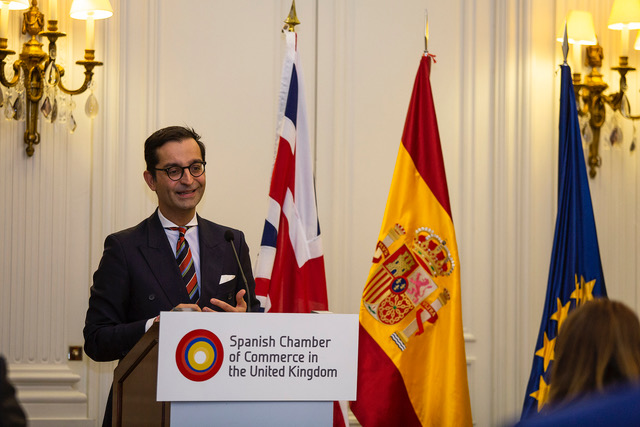
Spain and the United Kingdom are long-standing commercial partners. Approximately 20% of all outgoing Spanish investment is made in the UK, with Spain now amongst the top 10 international investors in terms of FDI. The UK – for its part – is the second-biggest foreign investor in Spain. What does the future hold for the commercial relationship between both countries?
Since 2016 (the year of the Brexit referendum) Spanish FDI in the UK has remained relatively stable at around 80 billion euros. Though there has been a slight downward trend (which is already being reversed), Spanish investment has largely stayed at constant levels despite the severe political uncertainty between 2017 and 2019. Seen from the opposite side, the UK is Spain’s second-most important commercial partner. The figures are testament to the strength of the commercial relationship.
The British market will continue to be extremely important for Spain given that it is itself a single market. At just two hours from Madrid, the Spanish exporter has access to an affluent market of 66 million people which is extremely competitive, offers a flexible labour market, has few language barriers, a prestigious judicial system, business-friendly regulators and a general ecosystem which mostly benefits commercial relationships. None of this will change. It is simply something Spanish businesses will not be wanting to give up.
We already knew that this was going to be a year for adapting to the new regulatory framework hence why nobody was taken by surprise.
At the Spanish Chamber of commerce the number of members has remained relatively stable and that is usually a good indicator.
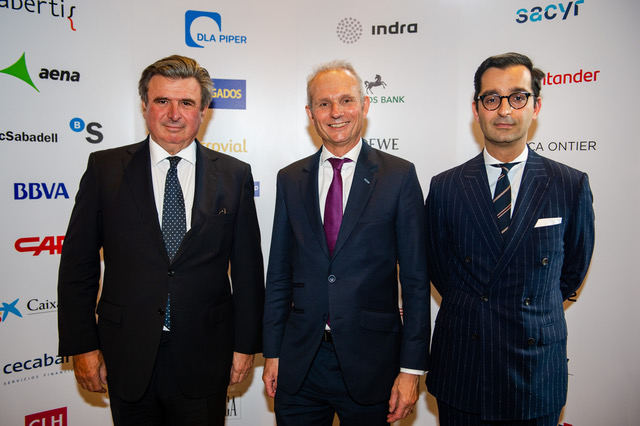
As President of the Spanish Chamber of Commerce in the UK, you are uniquely aware of the overall health of Spanish businesses, as well as their main doubts and challenges. What is the general feeling?
Both exporters and investors need certainty and a thorough knowledge of the legal, regulatory and political background of the market in which they are investing. Once an agreement was finally reached, all businesses could begin to adapt and restructure their operations. Not a single company has reached out to us with any serious concern which could be interpreted as warranting a market exit. On the contrary, there are some Spanish businesses which are extremely optimistic about the British market. Most worries are actually related to the Covid-19 crisis and the devastating effects it has had on certain sectors such as the hospitality industry, tourism or the airline industry.
But it’s not just that Spanish businesses have stayed put. In fact, many such as Meliá or CLH have been expanding and increasing their presence in the British market. Others in the construction industry have also undertaken extremely emblematic projects such as the dredging at Bank tube station and there are a few such as Cellnex or Ebro Foods which have recently entered the market for the first time.
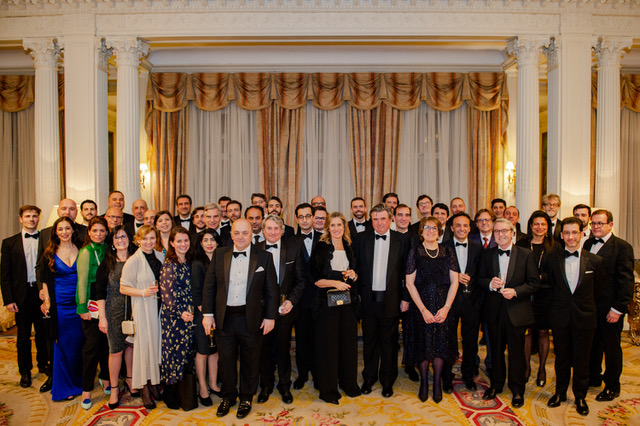
In the latest Barometer on the Climate and Perspectives of Spanish Investment in the United Kingdom, you point out the “huge contribution of Spanish business and talent in the British economy and British society alike”. What role do Spain and Spanish citizens living in the UK have to play?
Spain actively contributes to the British economy creating more than 160 thousand jobs, developing crucial sectors such as infrastructure, renewables or financial services and in certain areas such as the Midlands and the North revitalises communities which are not as prosperous.
There is also a large Spanish talent pool working in non-Spanish companies – an extraordinary contribution in terms of intellectual and human talent. The last fifteen years have been a total success for Spanish investment in the United Kingdom.
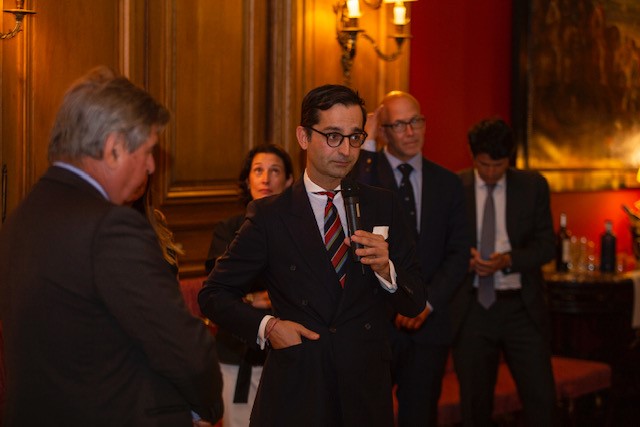
Farewell words to Ambassador Carlos Bastarreche, September 2020. 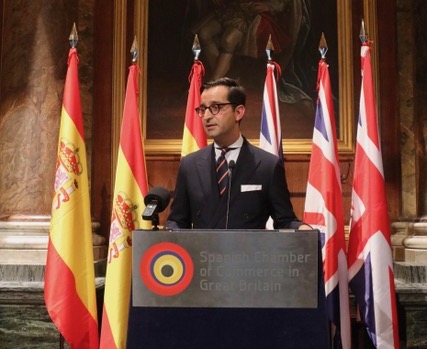
AGM Dinner, June 2019

With regards to the importance of Spanish: how relevant is it in the business world and in society as a whole? Is Spanish a factor conducive to cultural relevance?
The UK and Spain have a key factor in common, which is that both their languages are some of the most widely used in the world of business. Not Chinese, not Hindi and not even German are studied to carry out business affairs. They are also alike in that they both have large areas of cultural and historical influence: from Latin America to the Philippines or Guinea for Spain; and the whole of the Commonwealth in the case of the UK. Culturally speaking, they are world powers and are among the few countries which export a language, a culture and a unique set of values in equal measure.
The UK is the key to understanding the Anglo-Saxon world, with its political, economic, social and cultural values. On the other hand, Spain is the European link to the Hispanic world – our most universal cultural legacy which brings together over 400 million people around a common language.
Over the last few years, Spanish has overtaken both French and Spanish as the most widely studied foreign language at school. At time we forget the extent to which Spanish culture is such a unique economic asset. As Spaniards we are privileged to have real geniuses in all fields, as are the British.
Speaking of cultural exchange: how can the private sector contribute?
By actively participating in activities led by civil society – like FHB – or business organisations such as the Spanish Chamber of Commerce in the UK. At the Chamber we have recently signed an agreement to engage with the Instituto Cervantes in areas such as the City where they hadn’t been present up until now.
In general, civil society in the UK is much more organised. FHB’s work – inspired by British notions of civil society – is a living example of the importance civil institutions in coordinating talent and will power. NGOs support societies by channelling ideas and projects and in this respect the UK is the model to follow.
No one should forget that as the relationship between Spain and the United Kingdom becomes increasingly bilateral, it is as important as ever to promote cultural exchange in a strategic and efficient manner.
Since the very first arrival of the Duke of Wellington in Spain, the relationship between both countries has never been as good as today. We should make the most of this positive situation.
You have lived in the UK for many years. It is also in the UK that you completed your university s studies, before embarking on a professional career as a lawyer. In your personal experience: what are the differences in education and culture which make each country stand out?
In my own experience in the UK – which began as an Erasmus student at the University of Sheffield – I came to realise the differing societal value which is given to education in the UK and of course the differences in the teaching method. In the UK, education is sacred and is a state affair. In Spain this is simply not the case. Our biggest error as a nation has been to not be aghast at the current situation of education in Spain.
At first I struggled to study Law in England because unlike in Spain we spent most of our time reading sentences and my English was not too good back then. It certainly took a lot of effort. At times I would spend hours reading a sentence with the help of a dictionary but there were so many words I couldn’t understand that by the time I got to the end I wasn’t even sure who had won. However, studying law at Sheffield and later at King’s College London was to be an extraordinary way to understanding the British mentality.
With regards to culture and contrary to what is usually said, Spain and the United Kingdom are two countries which are much more similar than one may think. They are two nations with an imperial past and large geographic spheres of influence. They both deeply value their traditions though this is much more apparent in the UK. England idealises it’s past and embraces it to trace a clear direction into the future. Spain, on the other hand, still has many scores to settle with its history.
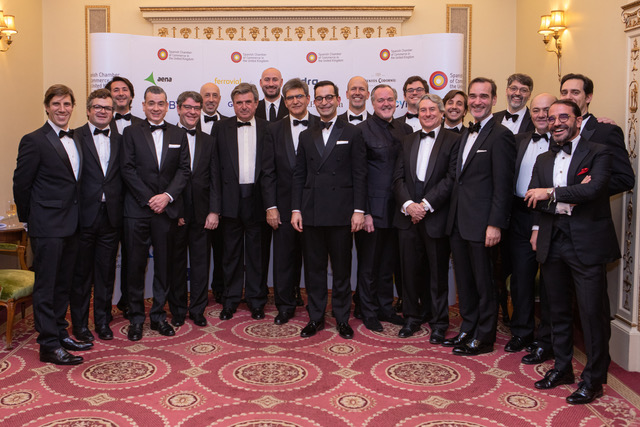
Do you think we understand each other well?
Without a doubt the relations between Spain and the United Kingdom are excellent and go beyond the economy. Hundreds of thousands of Spaniards live, study and work in the UK. This is also largely the case in Spain though the profile is slightly different and they are mostly families and retirees. This unique situation brings us much closer together.
For many Spanish citizens the UK has been the place where they have been able to kick-start and develop their professional careers. One should recognise the many professional opportunities the UK has facilitated to hundreds of thousands of Spaniards.
My own particular case is an example of these links. You realise you’ve been too long in England when without a moment’s thought you find yourself taking a Welsh rarebit at a gentleman’s cub on Pall Mall. It’s really during these moments you realise it’s been far too long.
2021 marks the Spanish Chamber of Commerce’s 135th anniversary. You must have experienced historical moments of special relevance…
The Chamber is living history of the Spanish presence in the United Kingdom and is the second oldest Spanish institution in London – after the embassy. When this institution was founded Queen Victoria was still on the throne. Among other events, she organised a banquet for King Alfonso XIII and even for Miguel de Unamuno. In 2011 we celebrated our 125th anniversary with the presence of the then Princes of Asturias. The Chamber also participated in the Kings’ 2017 state visit.
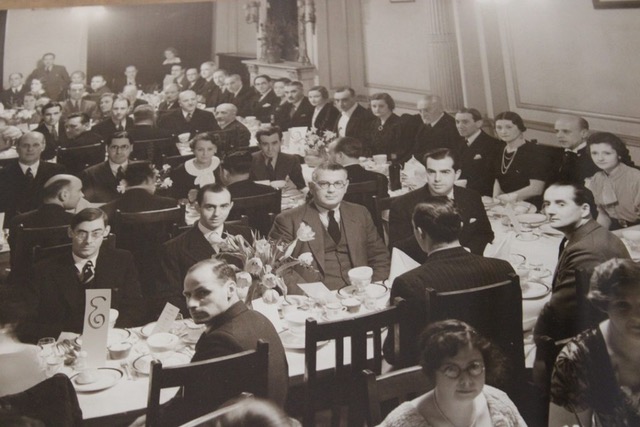
During the state visit I had the unique privilege to listen to Felipe’s speech in the British Parliament and to witness first-hand the immense institutional respect and affection in the UK for the Spanish Crown. It was extremely emotional to see Lord Fowler, Speaker of the House of Lords, finish his own intervention with a “Viva el Rey”. I remember the audience (made up mostly of parliamentarians from both chambers) being told that they had to respond with their own “Viva!”.
The history of the Chamber of Commerce portrays the excellent bilateral ties between both countries. We are an institution with more than a century of history and a profound vocation to the furthering of ties between both countries. A vocation to Spanish businesses which invest in the UK but also to Spain as a whole.

